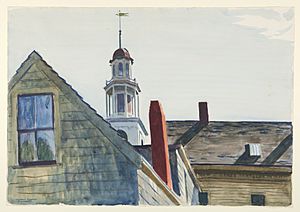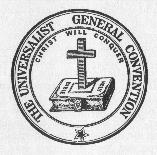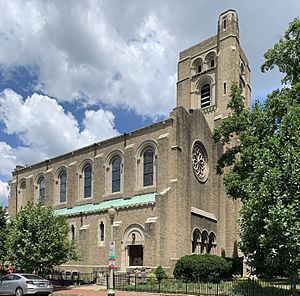Universalist Church of America facts for kids

Off Center Cross of Universalist Church of America before the 1961 merger.
|
|
| Abbreviation | UCA |
|---|---|
| Formation | 1793 |
| Dissolved | May 1961 (consolidation with American Unitarian Association to form the Unitarian Universalist Association) |
| Type | Christian religious denomination |
| Location |
|
|
Formerly called
|
Universalist General Convention |
The Universalist Church of America (UCA) was a Christian church group in the United States. It was also known as the Universalist General Convention for a time. In 1961, the UCA joined with another group, the American Unitarian Association. Together, they formed the Unitarian Universalist Association.
A main idea of Universalism is universal salvation. This means Universalists believe that a loving God would not send anyone to eternal punishment. They thought that all people would eventually be saved. Some early Universalists believed people might face a short period of punishment before being saved. Others, like Hosea Ballou, believed there was no Hell at all.
Contents
History of Universalism
Early Christian Roots
Some members of the Universalist Church of America believed that early Christians, like Origen, shared similar ideas about universal salvation. Historians suggest that this belief was common in some parts of the Christian world in the 300s and 400s AD. It was possibly taught by Gregory of Nyssa. According to one Universalist historian, four out of six early Christian schools taught universalist ideas.
The first person clearly known to believe in universal salvation was Gerrard Winstanley. He wrote a book about it in London in 1648.
Universalism in Early America

American Universalism grew from different religious movements in Europe. These included groups like Quakers, Moravians, and Methodists. These groups focused on personal faith and a "religion of the heart." Many early American Universalists were of German background. They mostly lived in the Mid-Atlantic states and Rhode Island.
Hosea Ballou and John Murray are often called the "fathers of American Universalism." John Murray started the first Universalist church in America in Gloucester, Massachusetts, in 1774.
Dr. George de Benneville was an important early Universalist preacher. He came to America in 1741. He shared Universalist ideas among German immigrants in Pennsylvania and New Jersey. He also helped translate a German book about universalism. Later, Elhanan Winchester read this book and became a Universalist. He helped print the first German Bible in America, which included passages supporting universal salvation.
In the South, Rev. Giles Chapman was a former Quaker and army chaplain. The first Universalist church in South Carolina was the Freedonia Meeting Hall.
Benjamin Rush, who signed the Declaration of Independence, believed in universal salvation. He was a strong opponent of slavery and worked to end it. He also wanted to abolish the death penalty and improve education for women. Rush was a pioneer in treating mental illness with respect. He helped start the first anti-slavery society in America. Like many Universalists, Rush believed that wicked people would face some punishment after death.
The first large Universalist meeting was held in 1778. Annual meetings began in 1785. At its peak in the 1830s, the Universalist Church was one of the largest church groups in the United States.
Joining Forces
In 1961, the Universalist Church joined with the American Unitarian Association. They formed the Unitarian Universalist Association. Some Universalist churches did not agree with this merger. These churches still exist today, but most are part of other church groups.
Church Organization
Universalist churches liked to be independent. They often had more power at the state level than at the national level. The church had three schools for training ministers.
Despite their independence, Universalist churches supported building the Universalist National Memorial Church in Washington, D.C. This church was meant to be the official church of Universalism. Funds were approved in 1921, and services began in 1925. The church building was finished in 1930. Its current members still follow Universalist ideas today.
Social and Political Views
The Universalist Church of America was involved in several social causes. They generally held liberal political views.
Fighting Slavery
As mentioned, Benjamin Rush was a key activist against slavery. In the 1850s, Universalists strongly opposed slavery. They believed it was wrong. After the Civil War, they supported laws to give all American citizens the right to vote.
Church and State Separation
Like many American religions, Universalists generally supported keeping church and government separate. In New England, Universalists were among those who spoke out against government-supported churches.
For example, in the 1770s, people in Massachusetts had to pay taxes to support the Congregational Church. Sixty-one people in Gloucester left that church to form a Universalist church. They refused to pay the taxes. Their church building was taken and sold to cover the taxes. However, the Universalist church sued and won their case in 1786.
Women as Ministers
On June 25, 1863, Olympia Brown became one of the first women in the United States to be ordained as a minister in a national church group. By 1920, there were 88 Universalist women ministers. This was the largest group of women ministers in the United States at that time.
Famous Universalists
- Hosea Ballou, a key theologian and preacher
- P. T. Barnum, a famous entertainer
- Clara Barton, who started the American Red Cross
- George de Benneville, an important early preacher
- Olympia Brown, one of the first women ordained as a minister
- Benjamin Rush, a Founding Father and anti-slavery activist
- John Murray, an early preacher
- Judith Sargent Murray, a writer who supported women's rights
- Ted Sorensen, an adviser and speechwriter for President John F. Kennedy
See also
- List of Unitarian, Universalist, and Unitarian Universalist churches
- Christian Universalism
- Universalism
 | James Van Der Zee |
 | Alma Thomas |
 | Ellis Wilson |
 | Margaret Taylor-Burroughs |



